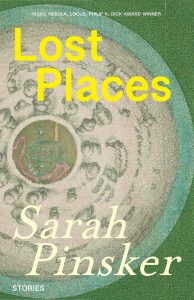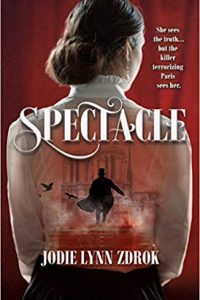Gary K. Wolfe Reviews Lost Places by Sarah Pinsker
 Lost Places, Sarah Pinsker (Small Beer 978-1-61873-199-9, $17.00, 288pp, tp) May 2023.
Lost Places, Sarah Pinsker (Small Beer 978-1-61873-199-9, $17.00, 288pp, tp) May 2023.
As with Valente, much of the appeal of Sarah Pinsker’s stories, 12 of which are collected in Lost Places, is her contagious enthusiasm for story in all its forms – not just short stories, fables, and fairy tales, but tacky old kids’ TV shows, improvised campfire tales, urban legends, mysterious ancient ballads, fading memories, even compulsive lying. In fact, it’s almost misleading to claim there are only twelve stories here, since the lead story alone, the Hugo and Nebula winner “Two Truths and a Lie”, embeds whole shards of other tales: the habitual fabrications of the protagonist Stella, the shadowy backstory of the hoarder whose massively cluttered house she agrees to help clean out, most of all the cryptic tales told by the creepy Stella appeared on as a child. While the story joins the small but interesting tradition of fiction about what we might call crypto-TV – other examples come to mind from Elizabeth Hand, Kelly Link, and Daniel Pinkwater – it opens up in unexpected ways that have nothing to do with nostalgia. Another story with a classic Twilight Zone vibe concerns a group of campers who return from a hike to find they’ve been gone for years and long considered missing – only this one is told by a character in another story, “Science Facts!” (original to this collection), which is about – well, a group of campers, who are unnerved by such tales told by the clueless drama teacher recruited at the last minute to be one of their counselors. Both “Two Truths and a Lie” and “Science Facts!” also feature characters more or less literally taking root, suggesting that stories, like the rhizomes that Pinsker alludes to in both tales, may be connected in hidden ways.
This idea is reinforced by the most celebrated story in the collection, “Where Oaken Hearts Do Gather”, which scored a rare trifecta winning Hugo, Nebula, and Locus Awards (as well as a Eugie Award and a World Fantasy nomination). Part of the appeal almost certainly comes from the unusual format – an extended and often snarky discussion on a website devoted to explicating lyrics of old ballads. The ballad itself, which lends the story its title, sounds convincingly real, with an elaborate pedigree of citations from classic folklore compilations like Child or Lomax, with recordings by everyone from Joan Baez to Dolly Parton to Metallica. Pinsker obviously knows her way around this stuff. But while the discussants debate what actually happens in the ancient doomed-lover ballad, another story emerges about a folklorist who disappeared years ago after apparently tracking the tale to its source village, and yet another about a contemporary researcher trying to retrace his steps. While the folk-horror elements may eventually look pretty familiar, the exploration of the nature of interpretation is nothing short of brilliant.
Pinsker’s fascination with odd corners of cultural history isn’t limited to old TV or ancient ballads. The most unselfconsciously celebratory story here is “I Frequently Hear Music in the Very Heart of Noise” (the title is a quotation from George Gershwin), an almost hallucinatory evocation of the artistic and musical life of Manhattan during much of the 20th century, loosely organized around the life of a fictional songwriter named Bess Morris and an imaginary hotel called the Ekphrastic, but featuring a whole pantheon including Gershwin, Scott and Zelda Fitzgerald, Georgia O’Keefe, and even David Bowie, all culminating in an impossible fever dream of a night featuring everyone from Duke Ellington and Billie Holiday to Debbie Harry and Leonard Cohen. It’s like a prose version of those celebrity-packed theater-district restaurant murals. Bess Morris shows up again in “A Better Way of Saying”, narrated by a young man who in 1915 works as a shouter – reading aloud the title cards of silent films for audience members who are deaf or illiterate – but who later, as a young reporter, finds himself involved in a bizarre (but apparently real-life) accident involving Douglas Fairbanks.
If Pinsker’s view of the past ranges from the magical to the morbidly curious, her vision of the future is relatively grim, but with cautious notes of hope. “Everything is Closed Today” seems to return us to the world of Song for a New Day, where terrorism and disease virtually confine people to their homes. When a bomb at a baseball game results in a general lockdown, including schools and libraries, an assistant librarian finds a new purpose in teaching neighborhood girls how to skateboard, which in turn leads to the possibility of community action. The algorithm-run healthcare system in “Escape from Caring Seasons” not only traps the octogenarian protagonist’s wife in the hospital, but virtually turns the assisted living facility into a prison, monitored by AIs who can track any resident through embedded chips, like an all-too-credible updating of the overprotective robots of Jack Williamson’s “With Folded Hands”. “That Our Flag Was Still There” is quite a bit less credible, with its notion of a lottery that names one citizen to become a living US flag, decorated and raised on a platform for a full day, even though some die in the process. But with its references to policebots, lists of “top patriots,” and “free speech permits,” it’s not hard to guess what sort of political posturing Pinsker is targeting.
Probably the most traditional fantasy settings are found in “The Boy Who Will Become Court Magician” and “The Mountains His Crown”, both set in familiar-looking imperial states, but with a few twists. In the former, a skilled amateur illusionist finally learns the secret of true magic, but also learns the cost is more than he’d counted on. The world of “The Mountains His Crown” is a bit more ambiguous; the farmers whose crops are destroyed by the emperor’s machines (for almost random reasons) recall a time when the local market included electronics, and occasionally they catch glimpses of the emperor’s airships and hovercars. Their plan for revenge still involves ancient technologies. Finally, “Left the Century to Sit Unmoved” – like a number of Pinsker’s cryptic titles, it’s literally a line from the story, concerning a character’s Buick Century – is a suitably creepy episode about a town’s favored local pond, which tempts jumpers even though it sometimes seems to simply swallow people. Of all Pinsker’s memorable characters, however, the most affecting is the famous artist at the center of “Remember This for Me”. Bonnie Sweetlove has had exhibits at the Whitney, but now – diagnosed with dementia – she needs to regularly consult her notebook to remember her caregiver or her niece, or even decisions she herself has made days earlier about a forthcoming retrospective. But her enduring belief in her Muse, which “suffused her with joy,” enables her to continue to make art, and to know when a work is finished. In one sense, it’s a wildly Romantic notion (in the Keatsian historical sense) of the sources of art; in another, it’s simply an unforgettable character sketch. Like the best of Pinsker’s fiction, it’s a kind of three-part invention of character, magic, and observation, and it rounds out a superb selection of tales.
Gary K. Wolfe is Emeritus Professor of Humanities at Roosevelt University and a reviewer for Locus magazine since 1991. His reviews have been collected in Soundings (BSFA Award 2006; Hugo nominee), Bearings (Hugo nominee 2011), and Sightings (2011), and his Evaporating Genres: Essays on Fantastic Literature (Wesleyan) received the Locus Award in 2012. Earlier books include The Known and the Unknown: The Iconography of Science Fiction (Eaton Award, 1981), Harlan Ellison: The Edge of Forever (with Ellen Weil, 2002), and David Lindsay (1982). For the Library of America, he edited American Science Fiction: Nine Classic Novels of the 1950s in 2012, with a similar set for the 1960s forthcoming. He has received the Pilgrim Award from the Science Fiction Research Association, the Distinguished Scholarship Award from the International Association for the Fantastic in the Arts, and a Special World Fantasy Award for criticism. His 24-lecture series How Great Science Fiction Works appeared from The Great Courses in 2016. He has received six Hugo nominations, two for his reviews collections and four for The Coode Street Podcast, which he has co-hosted with Jonathan Strahan for more than 300 episodes. He lives in Chicago.
This review and more like it in the March 2023 issue of Locus.
 While you are here, please take a moment to support Locus with a one-time or recurring donation. We rely on reader donations to keep the magazine and site going, and would like to keep the site paywall free, but WE NEED YOUR FINANCIAL SUPPORT to continue quality coverage of the science fiction and fantasy field.
While you are here, please take a moment to support Locus with a one-time or recurring donation. We rely on reader donations to keep the magazine and site going, and would like to keep the site paywall free, but WE NEED YOUR FINANCIAL SUPPORT to continue quality coverage of the science fiction and fantasy field.
©Locus Magazine. Copyrighted material may not be republished without permission of LSFF.





